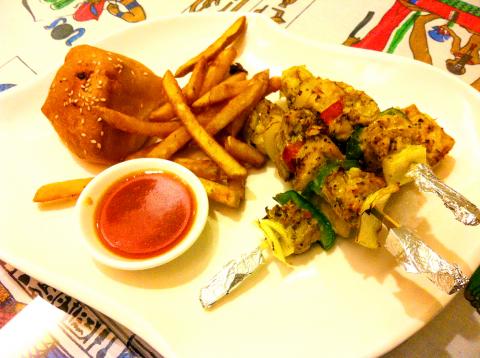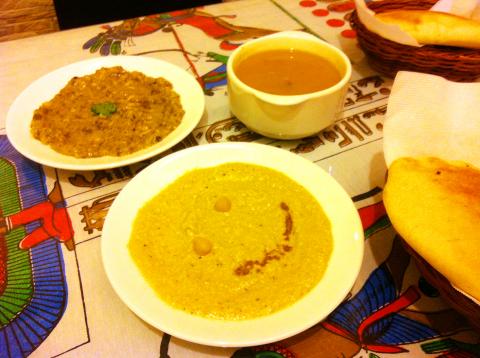With few restaurants in the city serving food that complies with Islamic traditions, Taipei can seem unfriendly to those who follow a halal diet. This is one reason Karim el-Nile opened Pharaohs, a restaurant and cafe serving Egyptian cuisine.
The establishment, which opened seven months ago on Taipei’s Taishun Street (泰順街), sports a modern wood-paneled decor and has the vibe of a casual, family-friendly cafe.
El-Nile, a 30-year-old Cairo native who married a Taiwanese and moved to Taipei almost three years ago, consulted with an Egyptian expat friend to come up with a modest menu of classic dishes from their native country.

Photo: David Chen, Taipei Times
For first-timers, El-Nile recommends the lamb stew with okra (NT$280), or Egyptian spicy beef stew with vegetables (NT$260), both of which are served with rice shaped in a pyramid (a novelty the kids will enjoy). He says these dishes are Egyptian versions of Moroccan tajine, a kind of stew slow-cooked in an earthenware pot. Pharaohs also offers beef (NT$160) and chicken shawarma (NT$160), the grilled meat that is a Middle Eastern fast food staple often served in a sandwich or wrap. El-Nile serves his with a homemade chipati-style flat bread.
On a visit earlier this week, our meal didn’t blow us away, but it did start and end well. For appetizers, we ordered freshly made hummus (NT$70) and baba ghanoush (labeled as eggplant salad on the menu). Served with warm flat bread (Arabian bread, NT$40) slightly thicker than a pita, the hummus had a creamy texture and was more satisfying than the baba ghanoush, which was nicely spiced but not quite thick enough. Or perhaps the hummus won because it was served with a smile: two chickpeas and a curved line of paprika made up the beaming face that topped our dish. The hearty lentil soup (NT$50 per bowl) was also well received, and together with the hummus and bread, would make a satisfying light meal.
The seekh chicken kebab (NT$220), whose name and curry marinade suggests an Indian or Pakistani flavor, is a recommended item on the menu, and one we didn’t regret ordering. The chicken was cooked just right — grilled and lightly charred on the outside and moist and tender on the inside. The meat is sliced into big, non-fatty chunks and skewered with onion and red, yellow and green peppers.

Photo: David Chen, Taipei Times
El-Nile says he has to strike a tricky balance with his recipes: he wants to please expats in the Muslim community and those familiar with Middle Eastern cuisine, but he also doesn’t want to alienate his Taiwanese customers. His solution is to make his fare “not too salty or oily” and to cut down on the sugar.
But maybe a little more of the bad stuff would have been better for the kofta dawood basha (NT$210), or beef meatballs served in a light tomato sauce with rice. We found the meatballs to be bland, although some might appreciate the unusual piquant sauce, which El-Nile says contains a “secret” blend of spices.
If you’ve been to Egypt and tried the local food, you might notice a few signature dishes missing from Pharaohs’ menu: falafel (which is said have originated in Egypt) and lamb kebabs. El-Nile says he plans to serve the latter in the near future; for now, falafel-lovers will have to stick with Sababa on Heping East Road (和平東路) to get their fix.
The friendly servers at Pharaohs wear fezes, which is vaguely charming, but it’s the milky-sweet rice pudding and rich panna cotta (NT$40 each) that will convince you to make a return trip.

April 14 to April 20 In March 1947, Sising Katadrepan urged the government to drop the “high mountain people” (高山族) designation for Indigenous Taiwanese and refer to them as “Taiwan people” (台灣族). He considered the term derogatory, arguing that it made them sound like animals. The Taiwan Provincial Government agreed to stop using the term, stating that Indigenous Taiwanese suffered all sorts of discrimination and oppression under the Japanese and were forced to live in the mountains as outsiders to society. Now, under the new regime, they would be seen as equals, thus they should be henceforth

Last week, the the National Immigration Agency (NIA) told the legislature that more than 10,000 naturalized Taiwanese citizens from the People’s Republic of China (PRC) risked having their citizenship revoked if they failed to provide proof that they had renounced their Chinese household registration within the next three months. Renunciation is required under the Act Governing Relations Between the People of the Taiwan Area and the Mainland Area (臺灣地區與大陸地區人民關係條例), as amended in 2004, though it was only a legal requirement after 2000. Prior to that, it had been only an administrative requirement since the Nationality Act (國籍法) was established in

Three big changes have transformed the landscape of Taiwan’s local patronage factions: Increasing Democratic Progressive Party (DPP) involvement, rising new factions and the Chinese Nationalist Party’s (KMT) significantly weakened control. GREEN FACTIONS It is said that “south of the Zhuoshui River (濁水溪), there is no blue-green divide,” meaning that from Yunlin County south there is no difference between KMT and DPP politicians. This is not always true, but there is more than a grain of truth to it. Traditionally, DPP factions are viewed as national entities, with their primary function to secure plum positions in the party and government. This is not unusual

US President Donald Trump’s bid to take back control of the Panama Canal has put his counterpart Jose Raul Mulino in a difficult position and revived fears in the Central American country that US military bases will return. After Trump vowed to reclaim the interoceanic waterway from Chinese influence, US Defense Secretary Pete Hegseth signed an agreement with the Mulino administration last week for the US to deploy troops in areas adjacent to the canal. For more than two decades, after handing over control of the strategically vital waterway to Panama in 1999 and dismantling the bases that protected it, Washington has